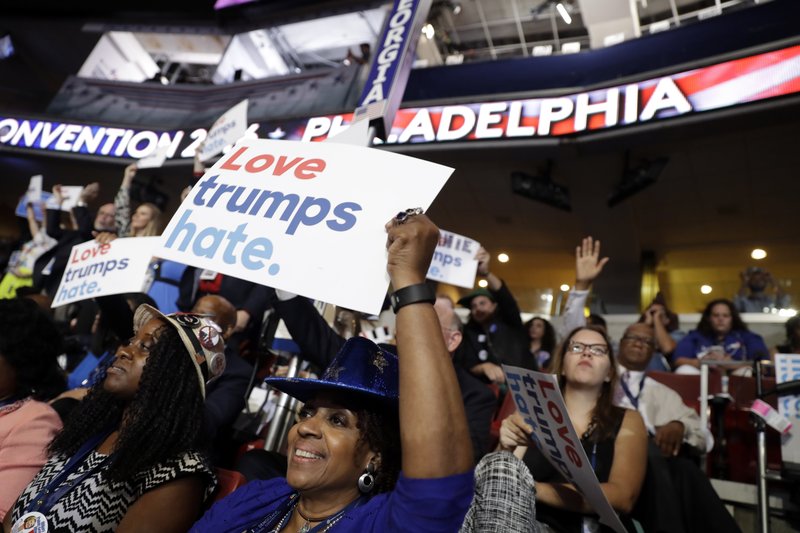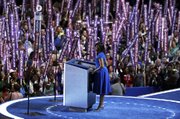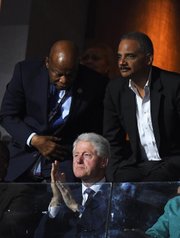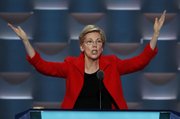PHILADELPHIA -- Former rivals Hillary Clinton and Sen. Bernie Sanders of Vermont joined forces Monday to tamp down dissent among his supporters as Democrats tried to keep infighting from overtaking a convention opening night featuring some of the party's biggest stars.
FULL ELECTION COVERAGE
RELATED ARTICLES
http://www.arkansas…">Arkansans exult in Sanders' campaign runhttp://www.arkansas…">Arkansas Democrats stirred by fears of Trump victory
http://www.arkansas…">Democrats' email leaks reopen 2 campaigns' rift
Sanders robustly embraced his former rival as a champion for the same economic causes that enlivened his supporters, signaling it was time for them, too, to rally behind the presumptive Democratic nominee in the campaign against Republican Donald Trump.
"Any objective observer will conclude that -- based on her ideas and her leadership -- Hillary Clinton must become the next president of the United States," he declared in a headlining address on the opening night of the Democratic convention. "The choice is not even close."
President Bill Clinton, watching from the audience, leapt to his feet and applauded, as did most of the delegates filling the convention arena.
"I understand that many people here in this convention hall and around the country are disappointed about the final results of the nominating process," Sanders said. "I think it's fair to say that no one is more disappointed than I am. But to all of our supporters -- here and around the country -- I hope you take enormous pride in the historical accomplishments we have achieved."
Sanders joined a high-wattage lineup of speakers, including first lady Michelle Obama, who delivered a forceful, impassioned defense of Clinton. Obama's address all but wiped away earlier tumult in the convention hall that had exposed lingering tensions between Clinton and Sanders supporters.
"I want someone with the proven strength to persevere, someone who knows this job and takes it seriously, someone who understands the issues a president faces are not black and white," Obama said. Referring to Trump's penchant for tweeting, she said of the presidency, "It cannot be boiled down to 140 characters."
She warned that the White House couldn't be in the hands of someone with "a thin skin or a tendency to lash out" or someone who tells voters the country can be great again.
"This, right now, is the greatest country on earth," she said.
Sanders previewed his remarks during an appearance earlier Monday before supportive delegates. He implored them to get behind Clinton and her running mate, Virginia Sen. Tim Kaine, and defeat Trump.
"Brothers and sisters, this is the real world that we live in," Sanders said as he tried to quiet the crowd. "Trump is a bully and a demagogue."
It was unclear whether the efforts would succeed. Minutes after the gavel went down in the Wells Fargo Convention hall, supporters of Sanders made their displeasure with the former secretary of state known.
They booed loudly at virtually every mention of Clinton's name and, at other times, defiantly led chants of "Bernie! Bernie! Bernie!"
By the time Sanders took the stage for the night's closing address, much of the anger had been overshadowed by speeches promoting party unity. Sanders did his part, imploring his supporters to consider a country under Trump's leadership.
"If you don't believe this election is important, if you think you can sit it out, take a moment to think about the Supreme Court justices that Donald Trump would nominate and what that would mean to civil liberties, equal rights and the future of our country," he said.
Sanders spoke just after Massachusetts. Sen. Elizabeth Warren, a favorite of liberals who has emerged as one of the Democrats' toughest critics of Trump.
Warren urged support for Clinton, but mostly she used her speech, billed as the night's keynote, to deliver cutting criticisms of Trump.
She said Trump is seeking to win votes "by turning neighbor against neighbor, by persuading you that the real problem in America is your fellow Americans, people who don't look like you or don't talk like you or don't worship like you."
"Donald Trump has no real plans for jobs, for college kids, for seniors," she said in the keynote address. "No plans to make anything great for anyone except rich guys like Donald Trump."
For Clinton, who spent the day campaigning in North Carolina, the divisions were a disappointment at a time when she wanted to project a message of orderly optimism.
"I'll tell you, we're going to have a very different kind of convention than they had last week," Clinton said at an event for volunteers at a theater in Charlotte.
She went on to attack Trump's penchant for praising dictators, lobbing personal insults -- "rotten Clinton" was his moniker of the day, playing off of her maiden name, Rodham -- and threatening to retreat from international alliances. And she insisted that the Democrats would put their best foot forward this week.
"I am very excited about contrasting our vision and values with what we saw from Donald Trump and the Republicans," she said.
Ousted chairman
It was a turbulent start to a four-day gathering that will culminate in the nomination of the first woman to lead a major U.S. political party. It also sapped some of Clinton's energy coming out of Trump's chaotic convention last week and the rollout Saturday of her running mate, Virginia's Sen. Tim Kaine.
Sanders scored a victory with the forced resignation of the party chairman, Debbie Wasserman Schultz, after the release of emails showing her staff favored Clinton during the primary despite vows of neutrality. But Sanders' aides reached out to the Clinton campaign Monday afternoon to express concerns that the chairman's ouster wouldn't be enough to keep supporters from disrupting the convention, according to a Democratic official.
The discussions between the two camps prompted Sanders to send emails and text messages to supporters asking them not to protest.
"Our credibility as a movement will be damaged by booing, turning of backs, walking out or other similar displays," Sanders wrote, because "that's what Mr. Trump wants."
Moments after the convention opened in Philadelphia, the Democratic National Committee apologized to Sanders and his backers "for the inexcusable remarks made over email." The statement was signed by DNC leaders, though Wasserman Schultz's name was notably absent.
The Florida congressman's resignation is effective later this week, though she also stepped down from her official convention duties.
Wasserman Schultz will still serve, however, as honorary chairman of the Clinton campaign's 50-state program, which aims to help Democrats in races throughout the country, and as a surrogate for Clinton in Florida and "other key states,"Clinton said in a statement.
Wasserman Schultz had planned to be among those taking the stage despite the contention caused by the release of the hacked emails. But she stepped aside, bowing to pressure from Democrats who feared the mere sight of her on stage would prompt strong opposition from Sanders' backers. She was also heckled by Sanders loyalists at a Florida delegation breakfast.
She was replaced by Baltimore Mayor Stephanie Rawlings-Blake, who opened the convention at 4:15 p.m.
Sanders was a relatively unknown senator from Vermont when he decided to challenge for the Democratic nomination. He stunned the Clinton campaign with his broad support among young people and liberals, as well as his online fundraising prowess. But he struggled to appeal to black voters and couldn't match the former secretary of state's ties to the Democratic establishment, which wields significant power in the primary process.
The 19,000 leaked DNC emails, posted by WikiLeaks over the weekend, showed top officials at the supposedly neutral DNC favoring Clinton over Sanders in the presidential primaries.
Outside the arena, several hundred Sanders backers marched down Philadelphia's sweltering streets. Signs carried messages such as "Never Hillary" and even in one case "Just go to jail, Hillary," an echo of the Republicans' "Lock her up."
Inside, Wasserman Schultz's absence did not appease Sanders supporters for long.
For three full hours, they objected nearly every time a motion was brought up for a voice vote, calling instead for a roll call; they chanted against the Trans-Pacific Partnership trade deal; they waved signs and banners.
Clinton aide Marlon Marshall and Sanders deputy campaign manager Rich Pelletier huddled in the afternoon to develop a joint plan to try to avoid excessive disruptions, an official said. This person spoke on the condition of anonymity.
Sanders sent out a signed text message to some supporters that reads: "I ask you as a personal courtesy to me to not engage in any kind of protest on the floor. Its of utmost importance you explain this to your delegations -- Bernie," the official said.
That was enough for Deborah Adams, of Cheraw, S.C., who served as a whip for the 14 Sanders delegates from her state's delegation.
"I think every delegate should follow Sen. Sanders' request," Adams said. "We've worked hard as a movement. It gives us a black eye if we don't control our emotions."
On the convention stage, one of Sanders's most ardent backers, Maine Rep. Diane Russell, urged his supporters to celebrate a real victory: the "unity commission" that would recommend cutting back the number of superdelegates, who are party officials who are not bound to vote for a nominee on the basis of the results of the primaries or caucuses.
"We did not win this by selling out," Russell said. "We won this by standing up."
But moments later, when Clinton supporter Rep. Elijah Cummings of Maryland rose to speak about his experience and the legacy of the civil-rights movement, hecklers rose to chant, in regard to the trade deal, "No TPP!" No TPP!"
Speakers' task
The party infighting had echoes of last week's Republican convention, where some major GOP leaders voiced their displeasure with Trump and others didn't even show up. Clinton promised a stark contrast to the GOP gathering, saying she planned to highlight "success stories" and flesh out details of her proposed policies.
Campaigning in North Carolina, Trump seemed to revel in the Democrats' commotion, telling supporters that Clinton made a mistake by not choosing a more liberal running mate to appease Sanders' base. "Crazy Bernie's going crazy right now," he said.
But in Philadelphia, delegates waved "Love Trumps Hate" signs and cheered as immigration supporters, gay-rights advocates, and labor leaders took the stage.
As the night progressed, a parade of speakers, including lawmakers, labor leaders and even pop stars, turned more fully toward making the case for Clinton and against Trump.
The rowdiest of delegates were calmed by a series of speakers who declared loudly that Clinton opposed the "job killing" Trans-Pacific Partnership trade deal. Others peppered their speeches with Spanish and highlighted stories of overcoming difficult odds.
They were interspersed with carefully crafted videos promoting Clinton's work on health-care change and her promise to address immigration reform.
"Valiente, brave. That's what Hillary Clinton called me when I told her I was worried about my parents being deported," said 11-year-old Karla Ortiz. "Hillary Clinton told me that she would do everything she could to help us.
"She told me that I didn't have to do the worrying because she would do the worrying for me and all of us."
Between speakers, old clips of Trump's interviews and speeches played through the convention hall.
"I don't want to sound too much like a chauvinist, but when I come home, and dinner is not ready, I go through the roof," he said in one clip.
Later, Clinton's campaign chairman, John Podesta, declared, "He is too erratic dangerous and divisive to entrust with the White House."
Al Franken of Minnesota, a comedian turned U.S. senator and a Clinton supporter, and actress Sarah Silverman, a Sanders supporter, made a joint appearance to promote party unity.
"I am proud to be part of Bernie's movement," Silverman said as the crowd roared. "And a vital part of that movement is making absolutely sure Hillary Clinton is our next president of the United States."
Trump was a frequent target throughout the night, though the jabs were often more mocking than mean. The tone was a sharp contrast to the Republican convention, where the attacks against Clinton was bitingly personal, including the chant of "Lock her up."
Information for this article was contributed by Julie Pace, Ken Thomas, Kathleen Hennessey, Catherine Lucey, Kathleen Ronayne, Lisa Lerer, Jeff Karoub and Julie Bykowicz of The Associated Press; by Abby Philip and Sean Sullivan of The Washington Post; and by Alan Rappeport, Yamiche Alcindor, Colin Moynihan, and staff members of The New York Times.
A Section on 07/26/2016



